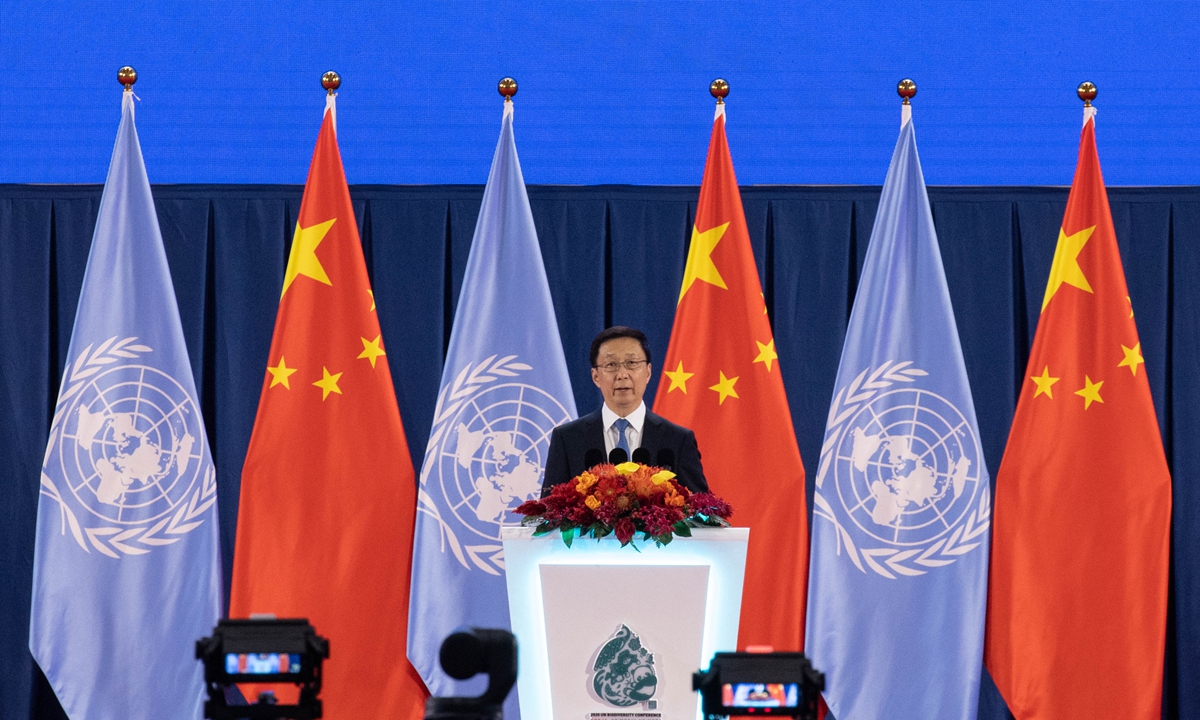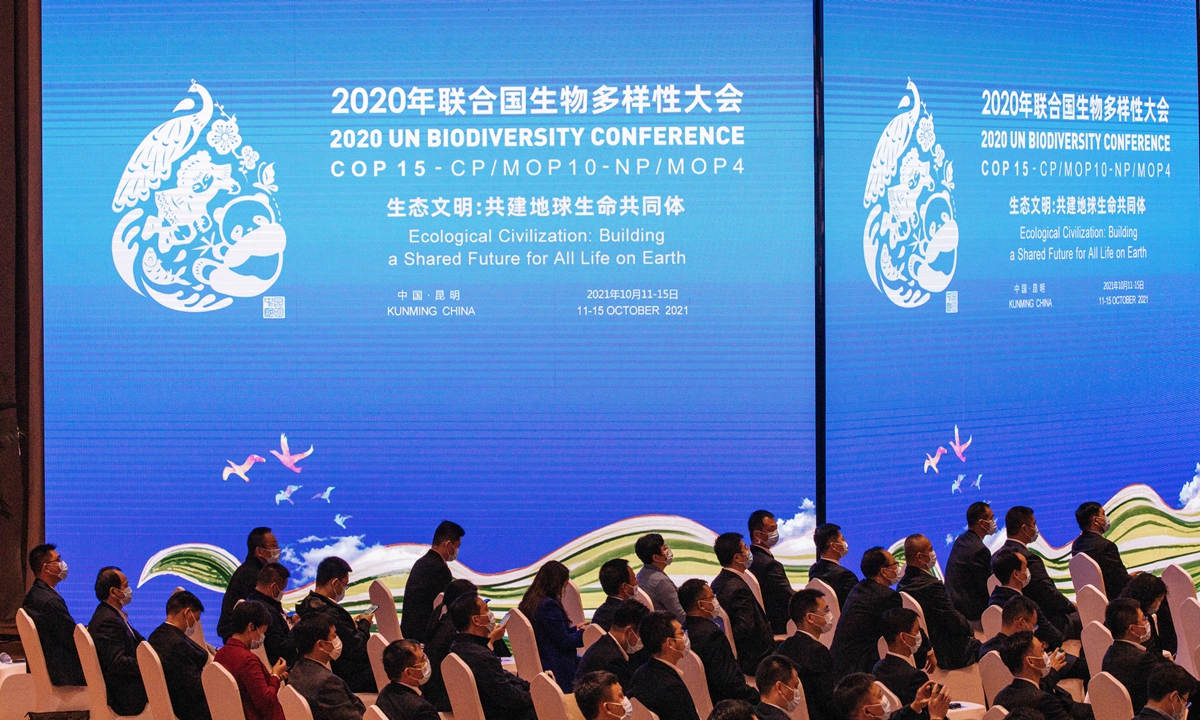
Chinese Vice Premier Han Zheng speeks at COP15 opening in China's southwestern city of Kunming, Yunnan Province. Photo: Li Hao/GT
China expressed a strong ambition to further strengthen biodiversity protection at the first global meeting convened by the UN on ecological civilization on Monday, and analysts who highlighted China's achievements in and contributions to the global biodiversity agenda believe many of China's practices, such as its ecological red line program, could help the world better achieve post-2020 targets for biodiversity conservation.
China will develop a new-era national biodiversity strategy and action plan and ensure full protection of important species and genetic resources, Chinese Vice Premier Han Zheng said on Monday at the 15th meeting of the Conference of the Parties to the UN Convention on Biological Diversity (COP15) in China's southwestern city of Kunming, Yunnan Province.
Themed "Ecological Civilization: Building a Shared Future for All Life on Earth," the meeting is the first global conference convened by the UN on the topic of ecological civilization.
Participants in the meeting are expected to review the "post-2020 global biodiversity framework" to draw a blueprint for biodiversity conservation in the future during the first part of the meeting in Kunming. The post framework will replace the Aichi Biodiversity Targets, which was set in 2010.
The second part of the meeting, to be held in person in the first half of 2022, will see broad and deepened negotiations toward an ambitious and practical framework.
Han made three proposals at the meeting - upholding multilateralism to scientifically set up the post-2020 global biodiversity framework, increasing investment and mobilizing resources to provide bigger support for protecting biodiversity, and accelerating reform to give priority to biodiversity conservation.
Elizabeth Maruma Mrema, executive secretary of the Convention on Biological Diversity, called on world leaders to translate their commitments into "policies, actions and results," while pursuing "a bold, inclusive and ambitious" global biodiversity framework.
"China's work over the last several decades represents our model of transformation, from actions to reduce pollution, restore degraded land, conserve species and ecosystems, and to tackle poverty and pursue broader human development goals," Mrema said.
"I would like to express my admiration for the actions that China has taken to protect and restore biodiversity," she said.
China is among the first countries to become a party to the Convention on Biological Diversity signed in 1992, and China's first white paper on biodiversity conservation, issued on October 8, detailed China's achievements in biodiversity conservation and contributions to addressing global biodiversity challenges.
Alice Hughes, executive secretary general of China Biodiversity Conservation and Green Development Foundation, a British zoologist at the Xishuangbanna Tropical Botanical Garden in Yunnan Province who attended the COP15 meeting, spoke highly of China's ecological conservation red line programe that identifies the country's crucial ecological zones and enforces strict protection in those areas.
China's ecological red line program is pushing the frontiers of how we can manage the ecology, and China has very bold ambitions when it comes to bending the curve of global biodiversity loss, she said.
"Ecological conservation red lines were a very good tool that could be applied globally," she said, noting it could be applied to Southeast Asia with the Belt and Road Initiative to help these countries map out a way to meet their post-2020 targets.
China's top-down systematic perspective of how to conserve large areas effectively is something that China is leading in global biodiversity protection, Hughes said.

COP15 opening Photo: Li Hao/GT
Aiming to reach new consensus
The biggest challenge for this meeting in Kunming is to set up high but feasible targets that will not make the post-2020 framework another Aichi target that most countries failed to reach, and this requires all-out efforts from governments, scientists and the public, Li Sheng, a researcher from the School of Life Sciences at Peking University, told the Global Times.
Li said he expects the meeting to strike a balance between biodiversity protection and economic development in negotiating the post-2020 targets, taking into account the development rights of developing countries, strengthen investment in basic research, and monitor the distribution of different species.
As a researcher on giant pandas, Li said China has significantly repaired the biodiversity loss through forest protection and returning farmland to forests, as the panda habitat increased by more than 11 percent from the third to the fourth panda population census.
Hughes has been exploring the targets for the post-2020 biodiversity framework, and she said one of the major parts of the framework is to monitor it - meaning, to generate the data and the information system to see if we are meeting the goals.
China is not only going to reach the goals of the post-2020 framework, but will help other countries, she said.
She listed the science plan of the Belt and Road Initiative, saying that part of the plan was to collect remotely sensed data to help in how we can develop sustainably and protect the environment. And "those kinds of innovations really helped China be a good leader, not just domestically but also internationally," she said.
However, in recent years, some Western countries including the US have turned a blind eye to China's achievements on biodiversity conservation and accused China of endangering wildlife with fishing and damaging rainforests.
China received unfair attention on environmental protection, such as when mentioning China and environment, some people often say ecological destruction, Hughes said. But "China has done a lot to change that in the last 10 years through campaigns like the "Beautiful China" initiative and the war on air pollution."
And the technologies that have been developed in China and elsewhere can help countries like Bangladesh and India, which still have huge air quality problems, she said.
"China faced the same problems as other countries,but it's actually fixed them much faster because it has used technological approaches," Hughes said.
Analysts said China will call on more collaboration on global biodiversity protection amid the uncertainties caused by the COVID-19 pandemic and international politics.
The US has never signed the Convention on Biological Diversity as it severely damaged biodiversity during domestic industrialization and extinguished a large number of species. It is not willing to pay the price or take responsibility for biodiversity conservation, Li Junfeng, former director general of China's National Center of Climate Change Strategy Research under the National Development and Reform Commission, told the Global Times.
Analyst said that the US-led Western countries made groundless accusations against China in the hope of containing China and other developing countries by taking the moral high ground.
China will firmly stand behind its commitments no matter how the US tries to smear China's efforts, Li said.
"We need to put politics aside and start thinking about what we as humans actually need to have an enjoyable life in the future and leave the world a better place for the next generation," Hughes said.





